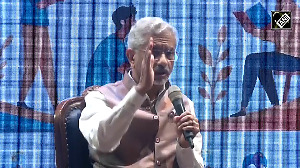
The road from Guna towards Bina, off National Highway 3, disputes the Bharatiya Janata Party's contention that infrastructure in Madhya Pradesh has declined in the decade of Congress rule. But then the smooth tarmac leads to Raghogarh, Chief Minister Digvijay Singh's constituency.
Raghogarh is not just a constituency for Diggy Raja, as he is known in these parts. It is part of the kingdom his ancestors have ruled for centuries. The constituency has 169,500 voters, and Digvijay Singh's election machine easily outpaces the BJP. Pre-poll surveys indicate the BJP will win Madhya Pradesh, but Raghogarh will continue to back the chief minister. He won the 1998 assembly election by a record 54,000 votes.
The family 'Mahal' is on a hill that overlooks Raghogarh. It is over 450 years old, and looks its age. The view of the town from the palace is magnificent. At night the lights below look so beautiful that one would not believe there is a power shortage in Madhya Pradesh.
Saboo Thomas is Rajgarh MP Laxman Singh's personal secretary. Laxman Singh is Digvijay Singh's younger brother, and has represented Rajgarh in the Lok Sabha since 1993 when his brother resigned his seat in Parliament to become chief minister of Madhya Pradesh. The chief minister, Thomas says, will return to his constituency only on November 29 -- the day campaigning ends -- to address a rally. Laxman Singh is standing in for his brother. The chief minister's wife will campaign only in the week before the election.
When one comes down from the palace one encounters the government hospital with its 30 beds. About 300 people visit the hospital every day, most complaining of fever and malaria. There is no shortage of medicine but the hospital could do with more staff. It only has three nurses and six doctors. There is a pathology lab, but no technician. The Gas Authority of India, which operates a plant in the CM's constituency, is now building a 50-bed hospital here.
Locals say the water problem is not so acute after the monsoon. The roads in the town are very good; even the smallest lanes are laid in concrete. But power is the biggest problem here, as in other parts of Madhya Pradesh. Ram Pratap Singh, a higher secondary student, says affluent students circumvent the power shortage by using inverters and emergency lamps. The poor use kerosene lamps, he adds, and the lazy employ the power cuts as an excuse not to study. The shortage of power is probably why there is no movie theatre in Raghogarh.
Narendra Lakhoti, the chief minister's campaign manager, is chairman of the Raghogarh Municipal Corporation. He proudly points out that 22 of the town's 25 ward members are Congressmen. Lakhoti, who says the Congress uses only three jeeps to canvass for votes in Raghogarh town, feels the BJP's decision to deploy Maharashtra's Gopinath Munde and Bihar's Sushil Kumar Mody to campaign for its candidate will backfire. Shivraj Singh Chauhan, the BJP candidate, is an outsider to these parts, Lakhoti adds.
Chauhan is a four-time MP from Vidisha; his wife Sadhana Singh is canvassing votes door to door.
Radhe Shyam Sharma, the BJP campaign manager, says he has a modest budget of Rs 30,000 for the fortnight left of campaigning. The BJP highlights the lack of power, water and bad roads not only in Raghogarh, but all over the state.
Ramesh Saini, who owns a STD booth, feels the Congress will win anyway. In the villages the poor will be intimidated to vote for the Congress, he claims, because government officials and the police openly support the ruling party. Bhujlal, an autorickshaw driver, agrees. His vehicles flies a Congress flag; " It will keep the police away from me at least till the election," he says.
Puran Singh, a retired government official, denounces the Congress, then startles this correspondent by saying he will vote for the chief minister. "If you live in the water you cannot afford enmity with the crocodile," he says.
Image: Uday Kuckian






 © 2025
© 2025